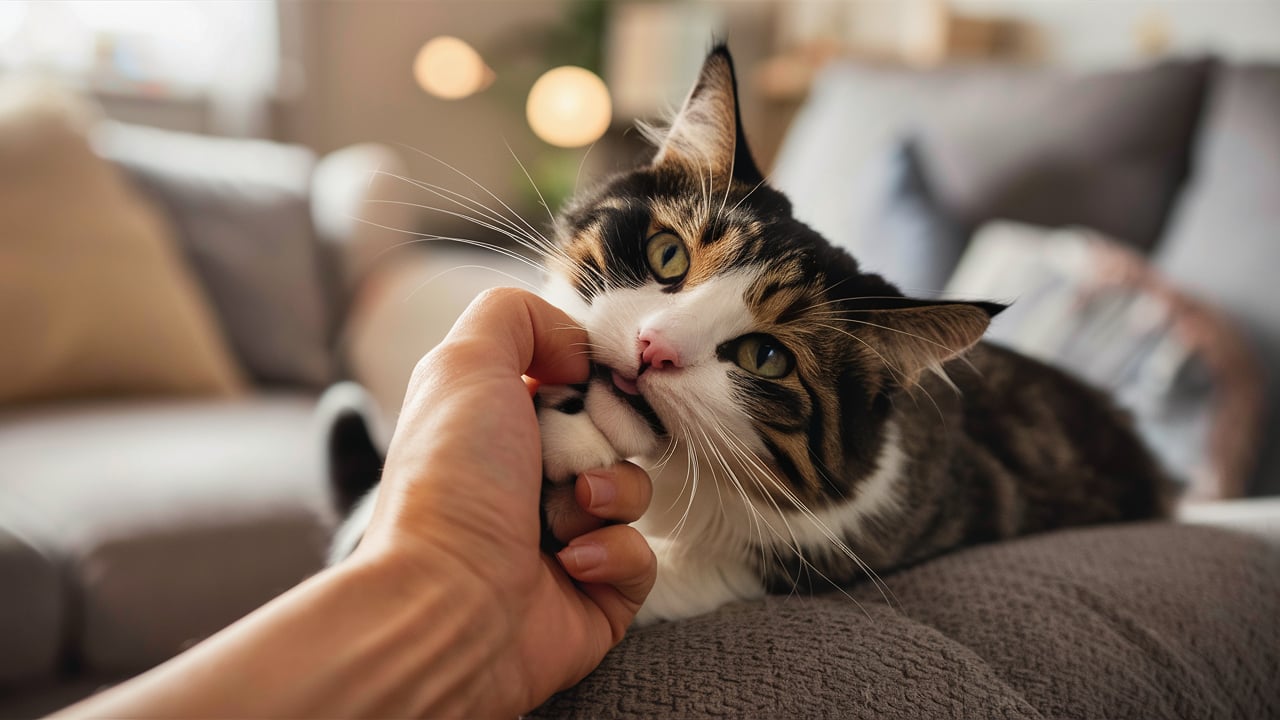Why does my cat bite me? Understanding why cats bite is crucial for maintaining a harmonious relationship with your furry companion. Let’s Cat Safety Tips explore the common reasons behind these painful incidents and learn how to prevent them.
Why does my cat bite me?
Understanding why your cat bites is the first step towards preventing these painful incidents and maintaining a harmonious relationship. Here are some common reasons behind those sudden, unexpected nips:
Playful Aggression
Cats are natural hunters, and their playful instincts can sometimes lead to over-excitement. During playtime, they may nip, swat, or jump at their “prey” (which could be you!), mistaking you for a fun, furry toy.
Fear and Anxiety
Cats are sensitive creatures, and fear or anxiety can trigger defensive behavior, including biting. Loud noises, strangers, unfamiliar environments, or even sudden movements can cause your cat to feel threatened and react defensively.
Pain and Illness
Why is my cat biting me? A cat in pain or experiencing discomfort may become irritable and more prone to biting. Illnesses like arthritis, dental problems, or even a simple ear infection can make them sensitive to touch and react defensively.
Redirected Aggression
When a cat’s frustration is directed at a different target, it’s called redirected aggression. Imagine your cat is feeling anxious about something, like a loud noise outside, but they can’t reach the source of their stress. They may redirect their frustration towards you by biting.
Territoriality
Cats are territorial by nature, and they may bite to defend their space, especially when feeling threatened. Introducing a new pet, changing the furniture arrangement, or even a new person in the house can trigger territorial aggression.

How to treat a cat bite?
Cat bites can be serious, as their teeth can carry bacteria that can cause infection. Here’s how to treat a cat bite:
Clean the Wound
- Wash thoroughly: Immediately wash the wound with soap and water for at least 5 minutes.
- Use antiseptic: Apply an antiseptic solution like iodine or hydrogen peroxide to kill bacteria.
- Remove debris: Gently remove any visible debris from the wound.
Control Bleeding
- Apply pressure: Apply gentle pressure to the wound with a clean cloth or bandage to stop bleeding.
- Elevate: If possible, elevate the bitten area to reduce swelling.
Seek Medical Attention
- Deep or puncture wounds: If the bite is deep, punctured, or shows signs of infection (redness, swelling, pus), seek immediate medical attention.
- Cat’s vaccination status: If you’re unsure about the cat’s vaccination status for rabies, seek medical advice.
- Symptoms of infection: Watch for signs of infection like fever, redness, swelling, pain, or pus. If any of these develop, contact a doctor.
Aftercare
- Keep clean: Keep the wound clean and dry to prevent infection.
Antibiotics: Your doctor may prescribe antibiotics to prevent infection. - Tetanus booster: If you haven’t had a tetanus booster in the past 10 years, your doctor may recommend one.
Important Note: Cat bites can be dangerous, even from seemingly friendly cats. Don’t underestimate the risk of infection. It’s always best to err on the side of caution and seek medical attention if you are concerned.
How to prevent cat bites?
Now that you understand why do cats bite you, let’s explore how to prevent these incidents and create a safer, more harmonious relationship with your feline friend. Here are some strategies to keep in mind:
Understanding Cat Communication
Pay attention to your cat’s body language. Flattened ears, dilated pupils, hissing, or a puffed-up tail are all signs of stress or anxiety. Recognizing these cues can help you avoid situations that might trigger biting.
Playful Aggression
Encourage appropriate play with interactive toys that allow your cat to chase, pounce, and bat. This will help them release their natural hunting instincts in a safe and constructive way. Avoid playing with your hands, as this can lead to confusion and accidental biting.
Fear and Anxiety
Create a safe and comfortable environment for your cat. Provide them with hiding spots, scratching posts, and plenty of toys to keep them entertained. Introduce new people and animals gradually, allowing your cat to adjust at their own pace. Consider using calming techniques like pheromone diffusers or calming music.
Pain and Illness
Schedule regular veterinary checkups to monitor your cat’s health. Address any underlying medical conditions promptly to alleviate pain and discomfort. This will help reduce their irritability and prevent defensive biting.
Redirected Aggression
Identify and address the source of your cat’s frustration. If they are anxious about something, try to minimize their exposure to those triggers. Provide them with outlets for their energy, such as toys, scratching posts, or climbing structures, to help them release pent-up frustration.
Territoriality
Introduce new pets gradually, allowing your cat to adjust to the new presence. Maintain a consistent routine to minimize stress and provide a sense of security. Offer your cat high-value treats or toys to help them associate the new presence with positive experiences.
Inconclusion
Understanding why your cat bites is crucial for building a harmonious relationship with your furry friend. By recognizing the signs of stress, providing appropriate outlets for their energy, and addressing any underlying medical issues, you can create a safer and more enjoyable environment for both of you.

Related Post
Does Cat Know When You Are Sad? Do Cats Love Their Owners?
Can Cats Eat Strawberries? Good For Cats?
Can Cats Eat Blueberries? Benefits, Risks, And How To Offer Them